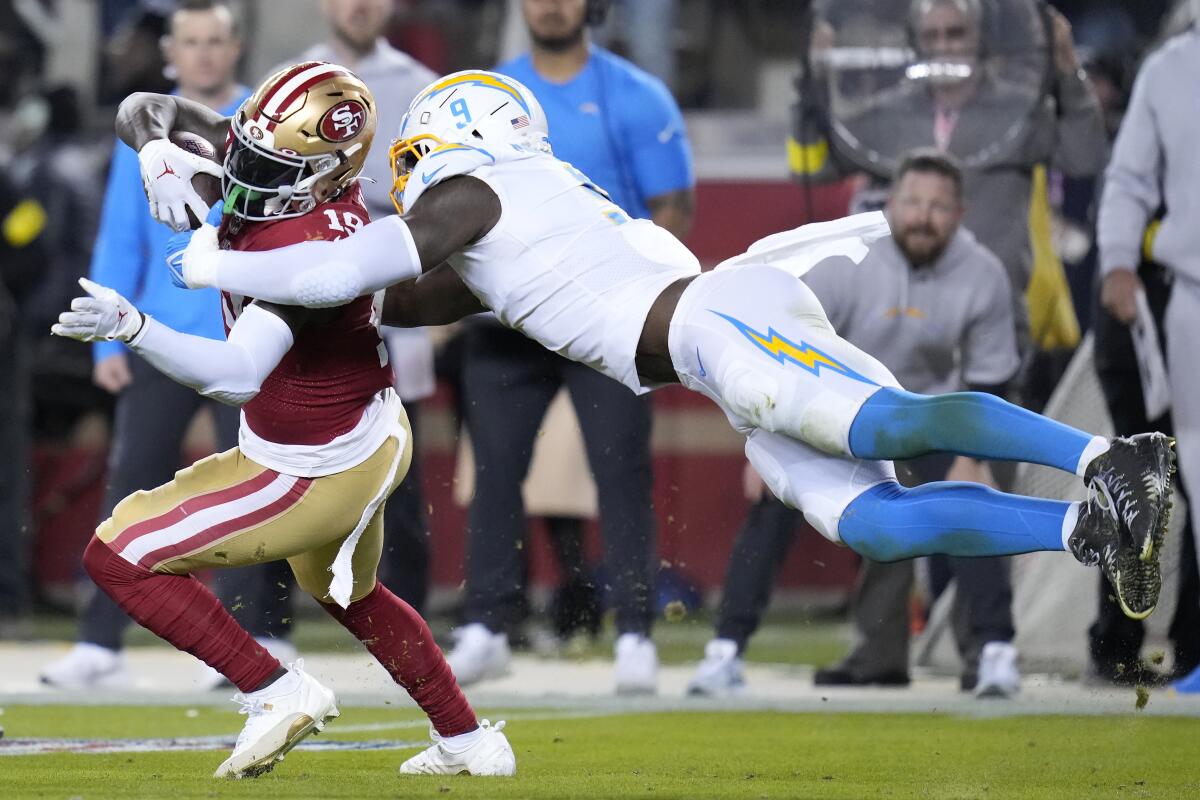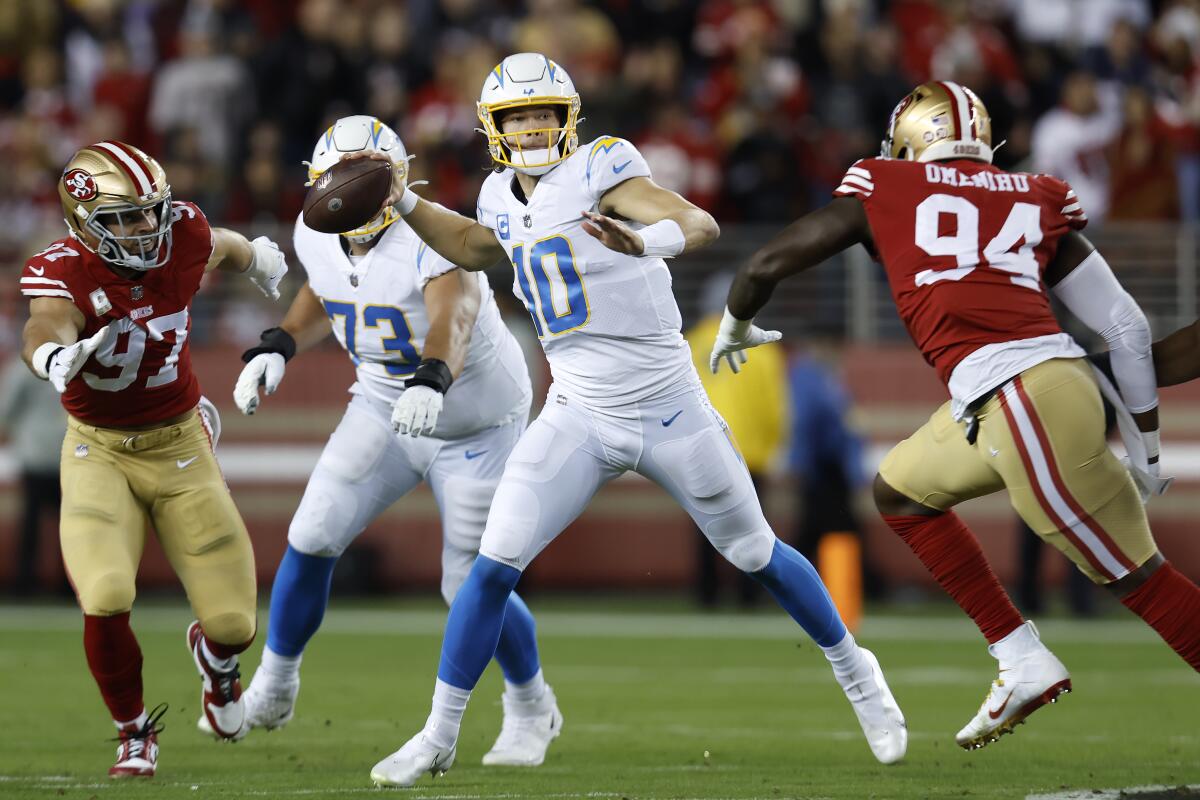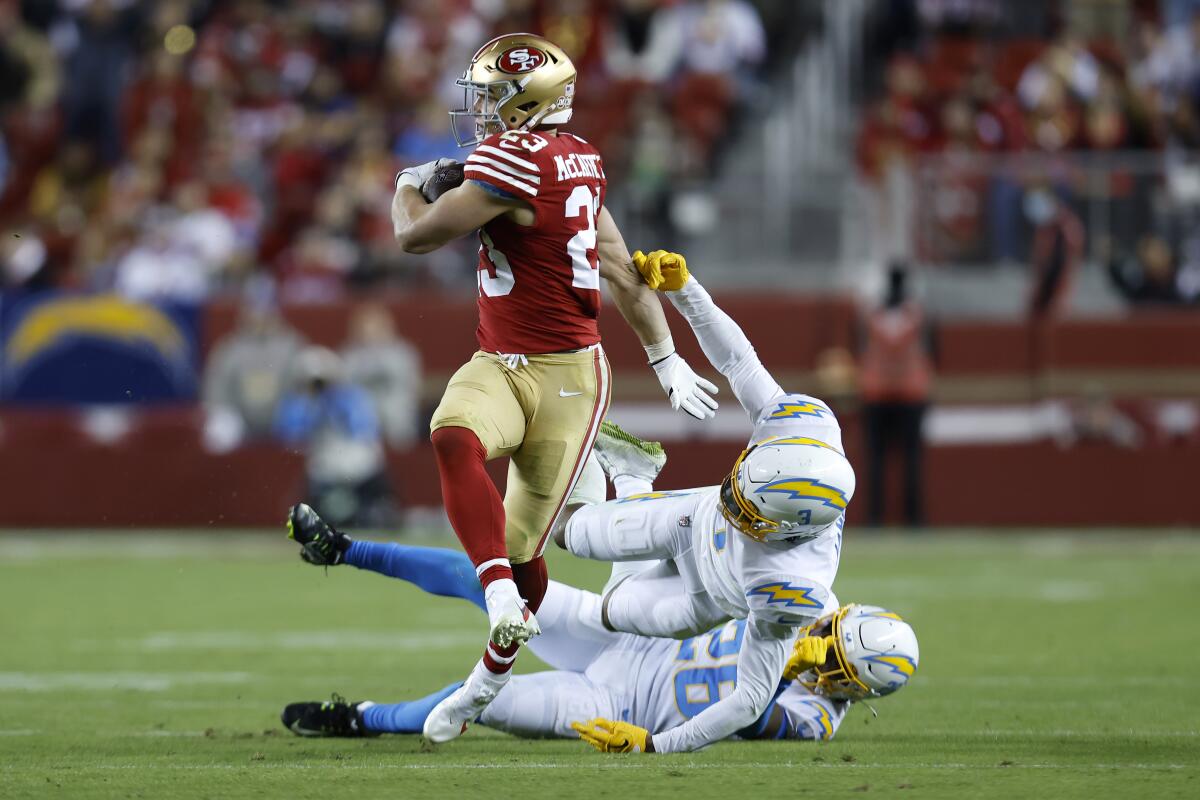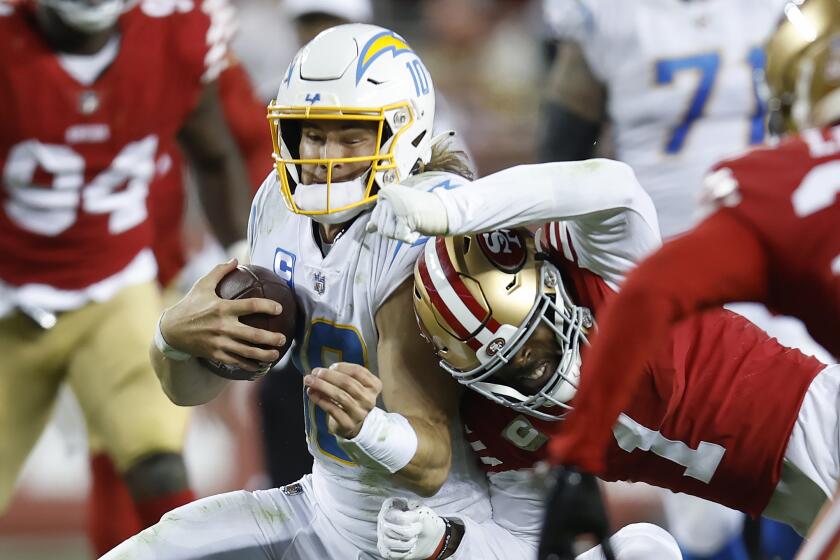Chargers shut out in second half as injuries undermine effort in loss to 49ers

- Share via
SANTA CLARA, Calif. — They led from the first four minutes until the final eight minutes while injury riddled and undermanned, on the road against an opponent with a deeper, more dynamic roster.
But the Chargers still lost 22-16 to the San Francisco 49ers on Sunday night, the NFL not a place where attaboys matter much.
“We didn’t come here to get a pat on the back for playing hard,” coach Brandon Staley said. “That’s not what this team is about. We came here to win tonight. ... Now, we didn’t win. But the effort and the physicality — the toughness of our team — that was good enough.
“That was what I expect in terms of going nose to nose with a good team. Our group didn’t back down tonight. Our team was the aggressor. We just didn’t go down in the second half.”
Justin Herbert started strong only to struggle in the second half after taking a helmet-to-helmet hit in the Chargers’ 22-16 loss to the 49ers.
After opening a 16-10 halftime lead, the Chargers were shut out the rest of the night. They ran only 19 plays for 52 yards and three first downs over the final two quarters.
Quarterback Justin Herbert was seven for 14 for 35 yards with one interception after halftime. The Chargers’ final first down came in the last two minutes of the third quarter on a Herbert sneak.
“That’s a good defense,” Staley said. “We just couldn’t get anything going in the run game. In the passing game, it was tight. The rush was coming. There wasn’t a lot of air in the second and third level to take advantage of.”
The Chargers began Sunday without their top two wide receivers — Keenan Allen (hamstring) and Mike Williams (ankle) both injured.
Right tackle Trey Pipkins III was questionable for the game because of a knee sprain and was unable to play.

Then, in the first half, the Chargers lost starting tight end Gerald Everett because of a groin injury.
Still, they hung tough to open their six-point halftime edge. Herbert connected with DeAndre Carter for a 32-yard touchdown pass on the Chargers’ opening drive.
Kicker Cameron Dicker had three field goals for the rest of the team’s points, the Chargers unable to reach the end zone on their final 10 possessions against a defense that entered No. 1 in the NFL in fewest total yards allowed.
The Chargers even lost Herbert at one point. He missed the final three plays of the first half after taking a hit to the head by San Francisco linebacker Dre Greenlaw.
Herbert was scrambling on third and six and was near the necessary yardage when, instead of sliding and ending up short, he lunged forward.
Herbert also was hit from behind while going down, the force of the tackle pushing him into the path of the closing-in Greenlaw. After a consultation by officials, Greenlaw was called for a 15-yard penalty and ejected from the game.
As he readied for the next play, Herbert was pulled off the field by the officials and directed to the sideline medical tent for evaluation. He was replaced by Chase Daniel. Two incompletions and a sack left the Chargers with a 40-yard field goal by Dicker on the final snap of the half, the kick making it 16-10.
Herbert was checked and quickly emerged from the tent. He remained out but returned for the Chargers’ first possession of the third quarter. The Chargers (5-4) also lost starting linebacker Kenneth Murray Jr. in the first half for concussion evaluation. He returned to the locker room and, after more testing, was permitted to return.
“I thought you saw good process in play,” Staley said of the way his players were evaluated, something that has been an issue this season for the NFL. “Hopefully, the world was able to see good process tonight.”
San Francisco (5-4) took its first lead with 7:54 left in regulation on Christian McCaffrey’s two-yard touchdown run.
The score — and subsequent missed extra point — made it 19-16, the 49ers converting three third downs en route to a 14-play, 77-yard drive that consumed nearly seven minutes.
They converted on third and five, third and eight and third and 10 as the Chargers could not get off the field.
By the end of the series, the Chargers were down to three available defensive linemen. They lost Christian Covington to a pectoral injury during the drive and earlier lost Otito Ogbonnia to a knee problem.

The Chargers entered the game without Austin Johnson, who was lost for the season because of a knee injury suffered last weekend in Atlanta.
Then, on Thursday, they waived former first-round pick Jerry Tillery after his relationship with the team deteriorated and could not be resolved.
Herbert opened the game by going four for four for 69 yards in leading the Chargers to their first first-quarter touchdown since Week 4.
His final connection covered 32 yards and went to Carter for the score. The touchdown was the second of the season for Carter and first since the Chargers’ season opener.
They went 75 yards in seven plays to take an early 7-0 lead, also the Chargers’ first of the opening quarter since Week 4. Entering Sunday, they had been outscored in their previous four first quarters 51-3.
But the Chargers were unable to sustain much after that quick start. They had only two series that lasted longer than seven plays all night and finished with nearly a 14-minute deficit in time of possession.
“Our team competed tonight,” Staley said. “I don’t know how you could see it any different. Our team competed against a team coming off a bye, a team that’s really, really good.”
More to Read
Go beyond the scoreboard
Get the latest on L.A.'s teams in the daily Sports Report newsletter.
You may occasionally receive promotional content from the Los Angeles Times.








